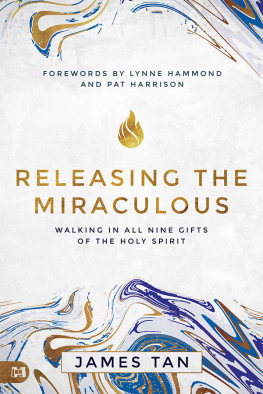1
The Phone Call That Changed My Life
I n my most undisciplined fantasies I would never have dreamed that a single phone call would alter the course of my lifeand not just my life, but a number of others in my circle.
Before that phone call I knew where I was going. My life was both comfortable and secure. I was in control and liked it that way. Most of the time I felt I knew what God was doing. But by the time I put the phone down on that cold day in January of 1986, all of that changed abruptly. I was no longer certain of where I was going and what I was doing, and I was beginning to wonder if I really knew what God was doing.
As it turned out, my life would never be the same after that phone conversation. I would never again feel the comfort and security that comes from thinking you are in control of your life. Granted, that is a false securityI know that nowbut it does feel good to be under the spell of that illusion. Had I known the pain and the trauma that lay ahead of me, I might never have picked up the phone. But then, as the words of a popular country western song say, I would have missed the dance, and that would have been the greatest pain of all.
I was the most unlikely candidate in the world for the joke that God was about to play on me. I was just completing my tenth year as a professor in the Old Testament department at Dallas Theological Seminary. I was entering my seventh year as one of the pastors at a Bible church in Fort Worth that I helped to start. The previous fall, I had just returned with my family from a yearlong study leave in Germany. It had been a wonderful year, and I was excited about returning to my teaching and pastoral duties.
My main passion was teaching and preaching the Word of God. I believed the most important thing in life was to study Gods Word and that most of our needsor at least our most important needscould be met through studying the Scriptures. If they could not be met in that way, then we were in trouble, for I had embraced a theological system that didnt leave God much room to help us in other ways. The God I believed in and taught about wasnt as involved in our lives as he had been in the lives of New Testament believers. At the time that didnt bother me very much because I thought he wanted it that way. I thought he had made the changes. To be sure, I thought God answered prayers, but only certain kinds of prayers.
For example, I knew that God no longer gave the miraculous gifts of the Spirit. There was no need for them; we had the completed Bible now. Of course, God sometimes did miracles. After all, he is God, and he can do anything he wants. It is just that he didnt do them very often. In fact, he did them so rarely that in all my years as a Christian I could never point to one healing miracle that I was confident was the result of Gods power. I had never even heard of such a miracle! Nor could I point to one in history that was properly documented after the death of the apostles. The one exception was conversions, which I believed then and still believe today are the greatest of all miracles. Other than conversions, the closest thing in my experience to a miracle were answers to prayers, especially those for financial needs, which sometimes seemed too specific to be left to mere coincidence.
This absence of New Testament miracles in my experience didnt bother me, however, because I thought God was the one who initiated this change. I was confident that I could prove by Scripture, by theology, and by the witness of church history that God had withdrawn the supernatural gifts of the Holy Spirit.
I was also confident that he no longer spoke to us except through his written Word. Dreams, visions, inner impressions, and the like, reeked of a subjectivity and an ambiguity that nauseated me. I cringed when one of my students came up to me and said, God spoke to me and Hardly anything could provoke a stern rebuke from me as rapidly as the statement, God spoke to me. To me those words implied that whatever communication was about to follow had the same authority as the written Word of God. That was not only presumptuous, it seemed blasphemous! I loved to heap ridicule on people who said God spoke to them.
As you might guess from what I have said so far, I was not the kind of believer who was looking for something more. I didnt need any healing miracles from God. My family and I had always enjoyed good health, and on those rare occasions when we needed a few stitches or a little medicine, our family doctors were more than adequate. Our congregation was also young and strong, and we had very few deaths in the seven years of our history. Divine healing just wasnt high on any of our priority lists.
I certainly didnt need God to speak to me with any of those subjective methods he used with the people of the Bible. After all, I had the Bible now, and I was one of those few people who also had exceptionally good theology. No, neither I nor my circle of friends were looking for something more from God. If I had any problems at all, it was just figuring out how to give more of myself to God.
My wife had a different view of things than I did. In fact, if there is a human reason why I should have gotten that phone call, I would attribute it to my wifes prayers for me. Leesa is one of those rare people who live the Christian life rather than talk about it. She would rather spend an hour praying for you than two minutes rebuking you for some obvious sin. Though she didnt say so at the time, she felt that I needed something more from God.
During the year we lived in Germany (1984-85), she would go on a two-hour walk every afternoon in the little mountains of the Black Forest. When I asked her about her walks, she told me that she was praying. I never asked her what for, and she never told me, but she was praying for me. Over the years she had watched my passion for God slowly drying up like the reservoirs in Southern California during a drought. I wasnt conscious of losing any passion for God. I thought I had just grown up. But she was concerned that I had become complacent and self-satisfied. And she say my attitudes as an enemy of Gods calling on our lives. Humanly speaking, I will always feel it was Leesas prayers that moved God to cause a man on the other side of the country to pick up a phone and dial my number.
Late in the fall of 1985, the leadership of my church decided we would have a spring Bible conference. After an elder meeting, as the chairman of the elder board and I were walking to our cars, he asked me whom I would like to have as a speaker for our spring Bible conference. Without hesitation I replied that I would like to ask Dr. John White, the British psychiatrist and Christian author. He had written about fifteen books at that time, all of which my wife and I had read.
He was my favorite popular author. I was absolutely sure he would do a wonderful job as our conference speaker. I knew from his writings that he held the Word of God in high esteem, that he was intelligent, that he was immensely helpful in the practical areas of Christian living, and I thought I had found clues that he, too, was a dispensationalist. (In fact, it did turn out that he had a Plymouth Brethren background.) We had been using his books for years in our Sunday school classes. The chairman of our elder board immediately agreed with my suggestion.
The next day he called Dr. Whites publisher to find out how we might entice him to come to our church. The publisher told him that most likely Dr. White would not accept our invitation because his schedule was already full for the next eighteen months. The publisher said the only chance we had of getting Dr. White would be if we asked him to speak on a topic he was currently writing or researching, since he did not like to speak on things he had already written about. The publisher gave us a few other hints in approaching Dr. White, but not much encouragement. Our chairman sent an invitation through the publisher, but in a short while we received Dr. Whites polite letter declining our invitation.













